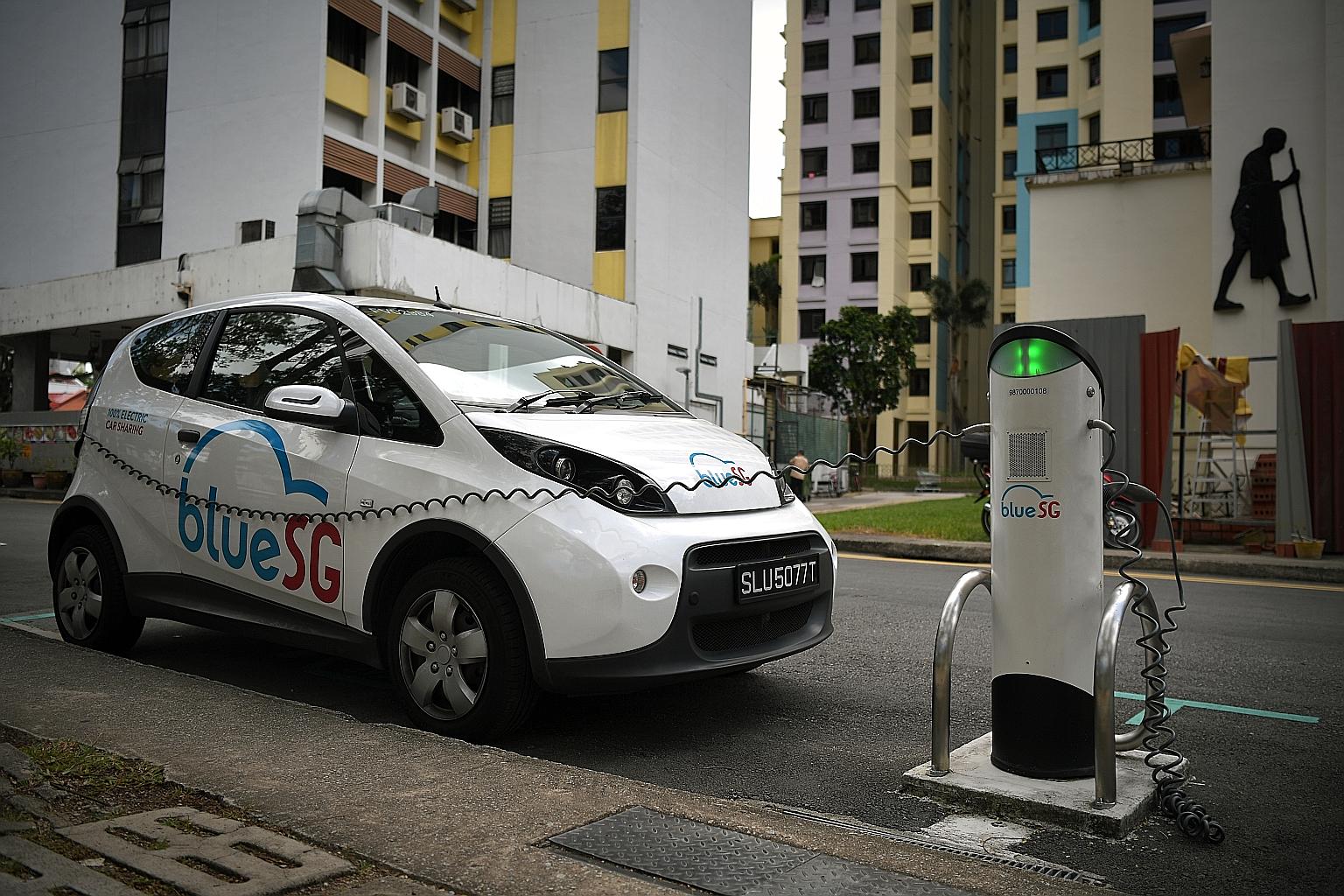BUDGET 2020 - HELP’S AT HAND: TO SUSTAIN SINGAPORE
Singapore Budget 2020: Boost for electric vehicles in move to reduce pollution
Measures include tax rebate extension, early adopter perks and more charging points
Sign up now: Get ST's newsletters delivered to your inbox

A BlueSG vehicle recharging in Race Course Lane. Mr Heng Swee Keat said Singapore will expand the electronic vehicle charging infrastructure significantly from 1,600 charging points now to 28,000 by 2030, a move that was hailed by diversified motor group Prime chairman Neo Nam Heng as a breakthrough.
ST FILE PHOTO
Follow topic:
In declaring its ambition to phase out internal combustion engine (ICE) vehicles within the next 20 years, Singapore will make electric vehicles (EVs) more attractive from next year.
"Our vision is to phase out ICE and have vehicles run on cleaner energy by 2040," Finance Minister Heng Swee Keat said, adding that this goal is for "both public health and climate change reasons".
Singapore has said that it sees climate change as an existential threat, and Mr Heng, who is also Deputy Prime Minister, yesterday announced several measures to make EVs a viable option.
First, the Vehicular Emissions Scheme (VES), which metes out tax rebates and surcharges based on a vehicle's emission levels, will be extended to light commercial vehicles.
Second, an early adoption incentive scheme will be rolled out for EV buyers from 2021 to 2023. It will offer a 45 per cent rebate on the car's Additional Registration Fee (ARF, the main car tax), capped at $20,000 per vehicle.
Third, the road tax for EVs and some hybrids will be revised to be less punitive.
Fourth, Singapore will expand the EV charging infrastructure significantly from 1,600 points now to 28,000 by 2030.
But as excise duty from fuel sales contributes around $1 billion a year to tax coffers, Mr Heng said the Government will introduce a six-monthly lump sum tax for EVs from 2021, starting at $100, then $200 in 2022, and $350 from 2023 onwards.
"Total road tax, after the revision in methodology and the new lump sum tax, will be higher for some EV models," Mr Heng said.
"However, EV buyers can expect to enjoy substantial savings because of the significant EV Early Adoption Incentive."
Mr Heng said the excise duty on fuel is a form of mileage tax to discourage indiscriminate usage, which will have an impact on pollution and congestion.
Industry players said this lump sum tax will negate much of the savings derived from the revised road tax.
For instance, the Hyundai Kona Electric, which is part of ride-hailing firm Grab's fleet, will see its annual road tax fall by around 36 per cent to $1,447. But the lump sum tax will pare this saving down to 4 per cent from 2023.
The buyer, however, will qualify for a $20,000 rebate on the car's ARF, which translates to a saving of around $10,000, assuming he keeps the vehicle for 10 years.
On the whole, the move was well received, even if the VES - which currently grants EV buyers a tax break of $20,000 - may change next year.
Mr Glenn Tan, deputy chairman and managing director of Tan Chong International, said: "This is good, as globally, manufacturers have been moving towards less pollutive vehicles, but the cost of adoption has been prohibitive. The increased rebate will encourage more people to adopt cleaner vehicles quicker, with the lower cost of ownership."
Nissan agent Tan Chong Motor's head of sales and marketing Ron Lim said the revised road tax means the Nissan Serena e-Power's road tax falls from $1,306 to $860 a year.
Mr Victor Kwan, managing director of multi-franchise Wearnes Prestige Division, said the tax changes are encouraging, but the move to build 28,000 charging points "will truly make a difference", even if it takes 10 years.
On the move to extend the VES to light commercial vehicles, Mr Neo Nam Heng, chairman of diversified motor group Prime, said: "I have been pushing for this for seven, eight years. This is a breakthrough.
"The market will evolve - just like the taxi market evolved from diesel to hybrid models. This will be positive for the environment."

